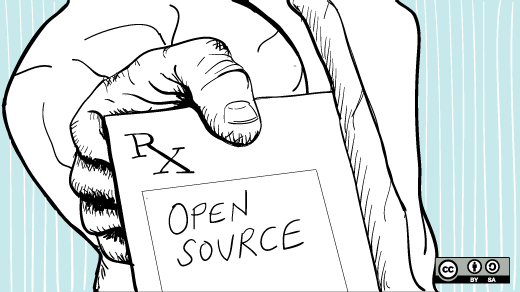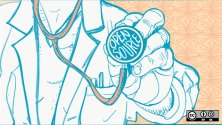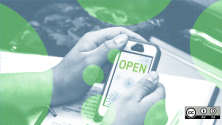Salvatore Iaconesi has brain cancer. And he's doing something about it that most don't: taking it into his own hands. And the hands of hundreds of others, as they all work together to cure his disease (and offer hope to others).
The project is called The Cure, and at it's apex as many as 200 people—doctors, surgeons, traditional practitioners, shamans, artists, designers, hackers, software engineers, ex-patients—were working simultaneously (and voluntarily) to contact people, arrange appointments, send out documentation and ask for opinions, and then collect all of the resulting information and classify it. They used pre-exisiting software tools and even produced and assembled some themselves.
Today, Salvatore uses all of this critical information to form a personal strategy, which he says is showing positive results. In this interview find out how open source software and concepts power this fantastic exploration into self-managed therapy.
What was your previous knowledge and understanding of open source before you were diagnosed with brain cancer and decided to make your medical records available at The Cure?
I have always been interested in the transformation of our current societies in the post-industrial years and, thus, I have always paid much attention to the ways in which human beings work, relate, learn, and consume. We have deeply changed since the wide and ubiquitous availability of digital technologies and networks. This is the reason why I approached open source and the free software movement.
The possibility to have free/libre access to knowledge and tools is the key element to being able to freely live and express ourselves. Personally, I have applied the concepts of open source and free software to art, architecture, design, development, and to multiple scientific disciplines—from the time when I was an avid skateboarder and researched the ways in which street art and performative practice could "open source" our urban surroundings, to recent times in which we can use ubiquitous technologies to define things such as peer-to-peer urbanism and collaborative governance practices of entire cities.
And everything that falls in between all of this.
Share how your concept of what open source is began and how this has evolved over time? What do you believe are the most important things that the 'open source movement' does to bring about good in the world?
We are in a delicate situation. Terms like open data, open source, collaboration, community, and even peer-to-peer are being (and have been) transformed into the "next industry." Obviously, there is nothing wrong or strange about this, as the global crisis has forced large operators to evolve towards new paradigms. But we really need to be aware of the radical transformation of these terms and of related themes, and the ways in which many of them have already been transformed into administrative, bureaucratic, and business-oriented terms. Which brings on a whole series of considerations to take into account, including the fact that, as of now, we, the people, have become the "products," the commodities, of this part of the post-industrial era.
Take open data, for example. From the idea of wide, distributed data ownership, to allow people to benefit from transparency and openness, it has already become a matter of administrative, bureaucratic, and business-oriented policies in which administrations deal only with operators in a dialogue whose objective is not really "anthropological." It doesn't aim at really enabling people to freely transform their lives by adopting novel paradigms and methodologies. It aims at creating a new industry in which data and people are the commodities. For example, the whole idea of "smart cities" perfectly shows this in the widely accepted interpretation of the terms: it is not about "smart citizens" enabled by open information and tools, but about operators providing sensors, infrastructures, clouds, apps, and other such things to city administrations. Human beings have disappeared from that discourse, except for them being producers of information and consumers of services.
What can open source do today?
It can remember its source, where it came from: a vision which is not really about software or hardware, but about humanity, and about human beings' transforming their lives, aiming at being able to freely, autonomously, and collaboratively create the world they want to live in. To do this, now, it is really important to focus on this idea, and to sincerely collaborate across disciplines, domains, and communities. And to avoid giving in to the issues generated by the global crisis: we really need to stop thinking about simple solutions and approach the complexity of the world around us.
Give us some examples of what open sourcing your medical records at The Cure did for you and your tumor?
Speaking about complexity, this action has created a whole set of complex processes. First of all, I was able to benefit from the availability of an enormous set of skills, competences, and information, and from the fact that everyone who contributed information and suggestions was also happy and willing to help out in sorting through all of this information—to classify it, verify it, to contact people and ask for further details.
There is a practical process to it all, but there are things that have happened that connect all of us on a more philosophical and anthropological level. People have understood—scientists, researchers, patients and ex-patients, relatives, professionals, journalists, passer-bys—that all this technology we have can help us be more human. Now, our lives are not really in our control. We are the passive subjects of many procedures, protocols, and mechanisms which are not really made for us.
Medicine is one of these processes. As soon as you are diagnosed with a thing such as cancer you are immediately "industrialized," you become part of a standard process which is not really talking about or with you, but about the standardized version of you which is inside the administrative, commercial, industrial, and bureaucratic models of hospitals, research institutes, public health, etc.
Even the technological tools which they offer you to express yourself are dedicated to this: patient-portals, e-health, e-patients, are all to stick you even deeper into the "process." They are made to transform even your desire for expression into a manageable, administrative asset. Instead, it is possible to use technologies to reunite with our humanity and to become active agents of our lives, interconnecting with society and working positively for our own well-being. People (and also multiple companies and organizations) have understood this, and its implications, and have activated themselves.
While I am curing myself, we are also working with multiple subjects to conceptualize, design, and implement some possible scenarios about this kind of possibility.
Do you think your approach and strategy to healing yourself is working?
My current strategy is composed from many interweaved elements, ranging from a radical dietary approach, homeopathy, traditional chinese medicine, all interconnected to the "standard" protocols and practices of medicine (for example oncology and neurology) and surgery. I am in the process of conducting cycles of this strategy and, after each cycle, checking my current status. Up to now, the results have been wonderful: my cancer has stopped growing and we are waiting for one more cycle to see if it is the case to further delay surgery, to benefit from a possible (even partial) regression.
Tell us about Art is Open Source, which has won an award from Greenpeace. What projects are you doing now and what is planned for the future?
Art is Open Source (AOS) was born in 2004 and is an informal international network which connects artists, hackers, designers, architects, street artists, performers, researchers, and academics to observe the ways in which human beings have transformed with the wide and ubiquitous availability of digital tools and networks.
With AOS, we do many things, from arts and performances to teaching and scientific research. Lately, we have been dealing with the idea of "human-centered smart-cities" to suggest scenarios that go beyond the sterile idea of the smart city (which I described earlier). We have been analyizing ways in which our perception of public and private spaces have changed with social networks and ubiquitous technologies.
In this we do all sorts of fun and less-fun (but useful) things, from academic and scientific research, to the production of wearable technologies, ubiquitous publishing techniques (we just did an Augmented Reality Movie, for example, and we are about to release a musical album which you can only listen to by coming to the city of Rome on my birthday! and walking around the city, as each track has been composed for a specific time/location).
We also teach in several universities and perform innovative education projects. Everything we produce in the process (software, documentation, books, technologies, methodologies, and so on) is released as open source under various licensing schemes (basically GPL).
Resources
The next article in this series will explore a host of resources from Salvatore and others involved in this work, including creative artwork, videos, and performances.






2 Comments